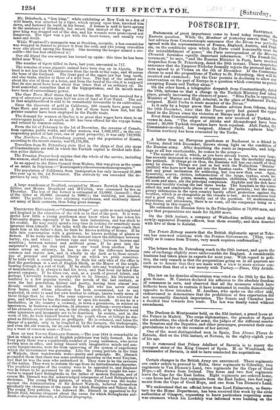POSTSCRIPT.
SATURDAY.
Statements of great importance come to hand today respecting the Eastern question. While the iforriteree of yesterday asserts that "the last advices from Constantinople announce that the Divan was perfectly agreed with the representatives of France, England, Austria, and Prus- sia, on the conditions upon which the Porte could honourably treat for the reestablishment of peace," the Paris correspondent of the Morning Chronicle furnishes equally. important information. "The French Go- vernment," he says, "and the Russian Minister in Paris, have received despatches from St. Petersburg, dated the 20th instant. These despatches
announce that the Emperor Nicholas formally rejects the protocol and the announce that the Emperor Nicholas formally rejects the protocol and the note agreed to at Vienna on the 6th of December. If the Conference choose to send the propositions of Turkey to St. Petersburg, they will be received and examined ; but the Czar persists in declining to allow any intervention on the part of Europe in a question which concerns no power excepting Russia and Turkey alone." On the other hand, a telegraphic despatch from Constantinople, dated the 19th, informs us that a change in the Turkish Ministry had taken
place, greatly increasing the chances of peace. "Riza Pacha is appointed Minister of Marine and High Admiral, in the place of Mahmond Pacha, resigned. Halil Pacha is made member of the Divan."
Is it only by a happy guess that Russian advice; from Odessa, dated the 16th December, state that the Peace party had gained the upper hand in the Divan since the victories at Sinope and in Asia ? Even from Constantinople accounts are now received of Turkish re- verses in Asia. " The sieges of Akiska and Alexendropol have been raised ; 20,000 Turkish irregulars have been repulsed. Abdi Pachs, the Commander-in-chief, has resigned. Ahmed Pacha replaces him." Russian territory has been evacuated by the Turks.
A letter from an European gentleman at Bucharest to a friend in Vienna, datefl 16th December, throws strong light on the condition of the .Russian army. After describing the roads as impassable, and lodg- ings as all but unattainable, he comes to the army- " The number of sick, which, as you have already learnt, was very large, has recently increased in a remarkable manner, as has the mortality among the patients. If things go on thus, the Russians will lose one-tenth of their army by disease. Things are just as bad with the Wallachian 'Boletus' (militia) who have now been put into the Russian ranks. These men never had any great inclination for soldiering, but less now than ever. Ague, dysentery, scurvy, cholera, inflammation of the lungs, typhus, acute in- flammation of the joints, measles, carbuncles, chilblains, with wounds of all sorts and sizes, are the principal complaints. Syphilis and the itch have increased terribly during the last three weeks. The hospitals in the towns afford dry and comfortable places of repose for the patients ; but the tem- porary, infirmaries in the open country hardly afford protection against the weather, which is as changeable as the climate is bad. As to nutritious food
and a is roof, they are totally out of the question. Of medicaments, physicians, and attendants, there s no want, all the companies being on a war footing in this respect." He estimates the Russian force in the Principalities at 78,000 men, and says that preparations are made for 54,000 more.
On the 20th instant, a. company of Wallachian militia seized their newly-appointed Russian officers, beat them soundly, and then deserted with five of them to Xalafat.
The Trieste Zeitung asserts that the British diplomatic agent at Tehe- ran has renewed relations with the Persian Government. [This, espe- cially as it comes from Trieste, very much requires confirmation.]


































 Previous page
Previous page